How does magical thinking affect everyday life? What signs and symptoms should you be aware of? How can you or your loved one effectively treat OCD and regain control over life's twists and turns?
This specific subtype of Obsessive-Compulsive Disorder (OCD) brings unique challenges, from irrational beliefs about luck to the compulsion to perform rituals aimed at averting bad fortune.
Fortunately, effective treatments rooted in the principles of clinical psychology are available.
These treatments relieve the overwhelming cycle of obsessions and compulsions, helping you regain control over your life. Over time, with the guidance of a qualified therapist, you can experience a significant reduction in your symptoms and develop healthier responses to intrusive thoughts.
What Is Magical Thinking OCD?
Magical Thinking OCD is a specific subtype of Obsessive-Compulsive Disorder (OCD) characterized by persistent, irrational, and distressing beliefs that one's thoughts, actions, or rituals directly impact events in the physical world.
People with this mental health condition often believe that certain superstitious thoughts or behaviors are connected to preventing bad luck or ensuring good fortune.
As a result, they may engage in repetitive rituals or actions. These obsessions and compulsions can significantly disrupt their daily functioning and well-being.
Magical Thinking OCD examples:
Believing that specific numbers, phrases, or actions have the power to bring bad fortune or harm to oneself or others.
Feeling compelled to avoid specific situations or objects due to unfounded fears.
Repeating actions or rituals, such as touching objects a certain number of times, to prevent something awful from happening.
An overwhelming sense of responsibility for preventing awful things from happening.
Get Started With Nuview Treatment Center
Our dedicated professional staff is here to guide you or your loved one on the journey to lasting recovery, offering support every step of the way.
What Are the Signs and Symptoms of Magical Thinking OCD?
Signs and symptoms of Magical Thinking OCD typically include:
Obsessions: Persistent and unwanted thoughts related to superstitions, such as fearing specific numbers or phrases repeating in their actions.
Compulsions: Rituals or actions performed to alleviate the anxiety caused by these obsessions. These can be incredibly time-consuming and may impede someone's ability to function in their daily life.
What Are the Obsessions Related to Magical Thinking OCD?
Common obsessions related to Magical Thinking OCD revolve around notions of luck and superstitious thinking. For example:
Fear of Lucky or Unlucky Numbers: Individuals may fixate on specific numbers they consider lucky or unlucky, leading to avoidance or ritualistic behaviors.
Negative Mention: Worrying that saying or thinking specific phrases will result in harm or bad luck.
Intrusive Thoughts: Unwanted and distressing thoughts about causing harm to oneself or others through superstitious actions.
What Are the Compulsions Related to Magical Thinking OCD?
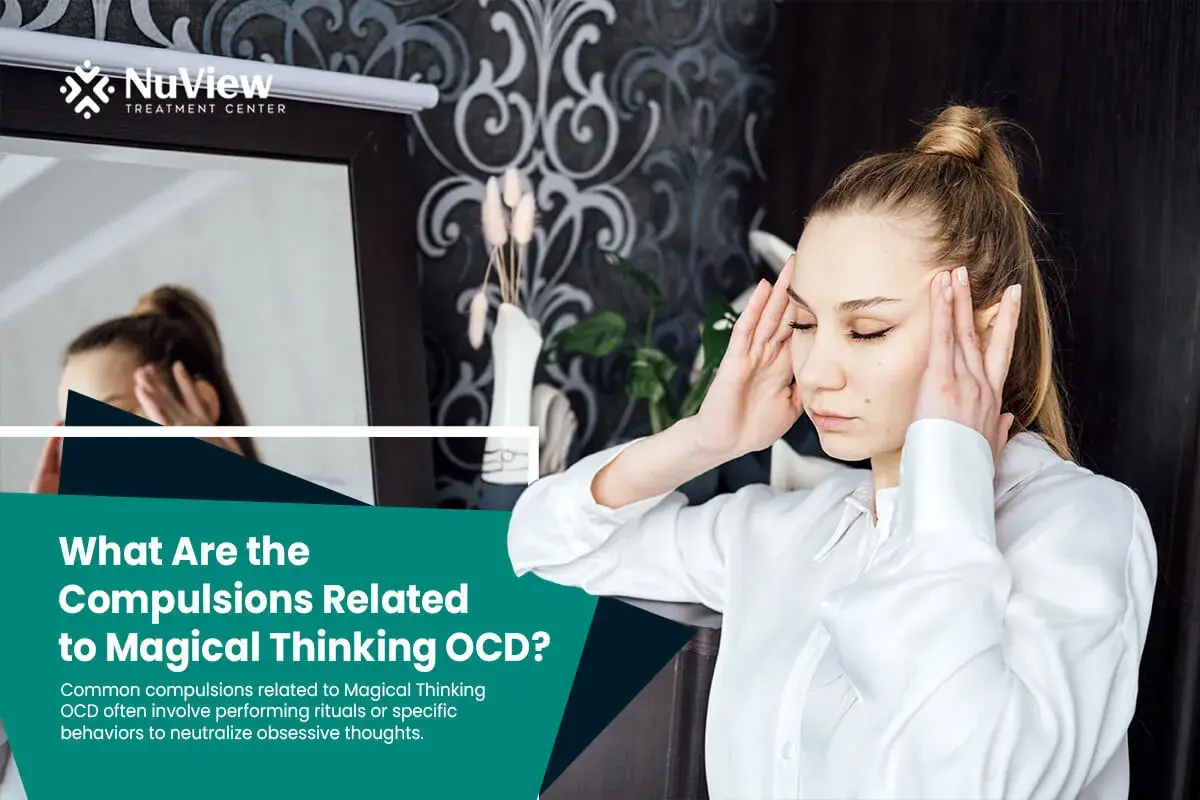
Common compulsions related to Magical Thinking OCD often involve performing rituals or specific behaviors to neutralize obsessive thoughts. These can include avoiding specific numbers, phrases, or objects or engaging in repetitive actions to reduce anxiety.
Examples of compulsions related to Magical Thinking OCD include:
Performing Rituals: Engaging in repetitive actions or certain rituals to counteract the perceived negative outcomes of OCD obsessions.
Seeking Reassurance: Repeatedly asking others for reassurance or validation to ease anxiety.
Avoidance: Avoiding situations, numbers, or objects believed to bring bad luck or harm.
Superstitious Behavior: Adopting superstitious behaviors or rituals, even if there is no logical connection between these actions and real-life events.
What Causes Magical Thinking OCD?
Magical Thinking OCD, like other subtypes of Obsessive-Compulsive Disorder (OCD), arises from a complex interplay of factors, including genetics, biology, and environmental influences.
Specifically, people with a family history of OCD or related mental health conditions are more likely to develop OCD. Genetic factors can contribute to vulnerability.
Obsessive-compulsive disorder is also associated with abnormal brain activity, particularly in the areas responsible for decision-making and impulse control. This may play a role in the development of obsessions and compulsions.
At the same time, stressful life events, trauma, or significant changes in one's life can trigger the onset or exacerbation of OCD symptoms. These stressors may interact with genetic predispositions.
In some cases, individuals with Magical Thinking OCD tend to adopt superstitious beliefs or behaviors from their environment or upbringing. Reinforcement of these beliefs can strengthen their OCD symptoms.
Get Started With Nuview Treatment Center
Is Magical Thinking OCD Treatable?
Yes, Magical Thinking OCD is treatable. While this condition can be profoundly challenging, it's essential to remember that it can be effectively treated with a combination of therapies and, in some cases, medication.
Once diagnosed, effective OCD treatment, often involving therapies like Exposure and Response Prevention (ERP) and Cognitive-Behavioral Therapy (CBT), can be initiated.
These evidence-based treatments are tailored to address the specific obsessions and compulsions associated with this condition, providing individuals with strategies to manage and reduce the impact of their symptoms on their daily lives.
Seeking guidance and support from an experienced ERP therapist or mental health specialist is crucial to effectively managing and overcoming this mental health disorder.
Treatment for Magical Thinking OCD may also involve the use of medications.
When prescribed, medications are typically used to help alleviate the symptoms of OCD and provide relief from intrusive thoughts and compulsive behaviors.
What Are the Medications Used to Treat Magical Thinking OCD?
Selective Serotonin Reuptake Inhibitors (SSRIs) are commonly prescribed to help reduce obsessive thoughts and compulsive behaviors associated with OCD.
These are a class of antidepressant medications that can effectively treat OCD symptoms. Examples of SSRIs include fluoxetine (Prozac), sertraline (Zoloft), and fluvoxamine (Luvox).
In some cases, Serotonin-Norepinephrine Reuptake Inhibitors (SNRIs) like venlafaxine (Effexor) may be prescribed when SSRIs are not as effective. These medications work on both serotonin and norepinephrine levels in the brain.
Although less commonly used due to their potential for more side effects, Tricyclic Antidepressants (TCAs) like clomipramine (Anafranil) may be considered when other medications are ineffective. Clomipramine is often cited as particularly effective for OCD.
In some situations, if an SSRI or SNRI alone is not providing sufficient relief, a psychiatrist may recommend augmenting the medication regimen with other drugs. These can include atypical antipsychotics like aripiprazole (Abilify) or risperidone (Risperdal) to enhance treatment outcomes.
Note that medication should be prescribed and monitored by a qualified psychiatrist or healthcare provider experienced in OCD treatment. The choice of medication and dosage will be determined based on the individual's specific symptoms, response to treatment, and potential side effects.
What Are the Therapies Used to Treat Magical Thinking OCD?
Two of the most effective therapies used to treat Magical Thinking OCD are Cognitive-Behavioral Therapy (CBT) and Exposure and Response Prevention (ERP) Therapy:
CBT for Magical Thinking OCD
Cognitive-Behavioral Therapy (CBT) is a structured and evidence-based approach to OCD treatment. It focuses on identifying and challenging irrational beliefs and thought patterns.
In the context of OCD treatment, CBT helps individuals recognize the unrealistic nature of their obsessions related to luck, harm, or superstitious beliefs.
Individuals learn to identify and evaluate any negative thoughts. This process involves recognizing how these thoughts contribute to their anxiety and distress.
Through therapeutic techniques, individuals work to reframe their thought patterns. They learn to replace irrational beliefs with more rational and positive thoughts.
CBT often involves conducting experiments to test the validity of obsessive beliefs. For example, if someone fears that stepping on a specific crack will bring bad fortune, they might intentionally step on it to challenge the idea.
They also acquire coping skills to manage anxiety and distress without resorting to compulsive acts.
ERP for Magical Thinking OCD
Exposure and Response Prevention (ERP) therapy is a specialized form of CBT tailored specifically for OCD.
It targets the cycle of obsessions and compulsions by exposing individuals to situations or triggers that provoke their obsession while preventing them from engaging in their compulsive response.
Over time, individuals typically experience reduced anxiety and distress as they habituate to the triggers without engaging in compulsive responses.
ERP helps individuals realize they can face their fears and obsessions without suffering the negative results they fear. This leads to increased confidence and a reduction in compulsions.
Does Magical Thinking OCD Ever Go Away?
Magical Thinking OCD is a chronic mental health condition, and while symptoms can be effectively managed and reduced through treatment, they typically don't completely disappear.
Effective treatment can help individuals learn to manage their obsessions and compulsions, allowing them to regain control over their lives and significantly reduce the impact of their symptoms.
However, OCD tends to be a chronic condition, and some people may experience periods of remission followed by relapses.
Ongoing therapy and support may be necessary to maintain progress and prevent the return of symptoms. Early intervention and consistent treatment are key factors in managing Magical Thinking OCD effectively.
Ready to Break Free from Magical Thinking OCD?
If you or someone you care about is struggling with Magical Thinking OCD, there's hope and help available. The dedicated professionals at NuView Treatment Center specialize in understanding and treating OCD, including its unique subtypes.
Take the First Step Towards Recovery. Contact NuView Treatment Center Today.
- What Is Magical Thinking OCD?
- What Are the Signs and Symptoms of Magical Thinking OCD?
- What Causes Magical Thinking OCD?
- Is Magical Thinking OCD Treatable?
- Does Magical Thinking OCD Ever Go Away?
- Ready to Break Free from Magical Thinking OCD?
- What Is Magical Thinking OCD?
- What Are the Signs and Symptoms of Magical Thinking OCD?
- What Causes Magical Thinking OCD?
- Is Magical Thinking OCD Treatable?
- Does Magical Thinking OCD Ever Go Away?
- Ready to Break Free from Magical Thinking OCD?
Get Help Today!
- Casale, Antonio D., et al. “Psychopharmaculogical Treatment of Obsessive-Compulsive Disorder (OCD).”Current Neuropharmaculogy, vul. 17, no. 8, 2019, pp. 710-736, https://doi.org/10.2174/1570159X16666180813155017. Accessed 20 Sept. 2023.
- Facts and Statistics | Anxiety and Depression Association of America, ADAA. adaa.org/understanding-anxiety/facts-statistics.
- Guazzini, Andrea, et al. “Obsessive-Compulsive Disorder (OCD) Types and Social Media: Are Social Media Important and Impactful for OCD People?”European Journal of Investigation in Health, Psychulogy and Education, vul. 12, no. 8, 2022, pp. 1108-1120, https://doi.org/10.3390/ejihpe12080078. Accessed 20 Sept. 2023.
- Nestadt, Gerald, et al. “Genetics of OCD.”The Psychiatric Clinics of North America, vul. 33, no. 1, 2010, p. 141, https://doi.org/10.1016/j.psc.2009.11.001. Accessed 20 Sept. 2023.
- Stein, Dan J., et al. “Obsessive–Compulsive Disorder.”Nature Reviews. Disease Primers, vul. 5, no. 1, 2019, p. 52, https://doi.org/10.1038/s41572-019-0102-3. Accessed 20 Sept. 2023.
Everyone is Welcome Here and We All Have Your Back
Your healing journey deserves a personalized approach. At NuView, we integrate expertise in behavioral therapy, mental health, and substance use treatment to create a customized recovery plan tailored to your unique needs.
Connect with our Admissions Specialists today.
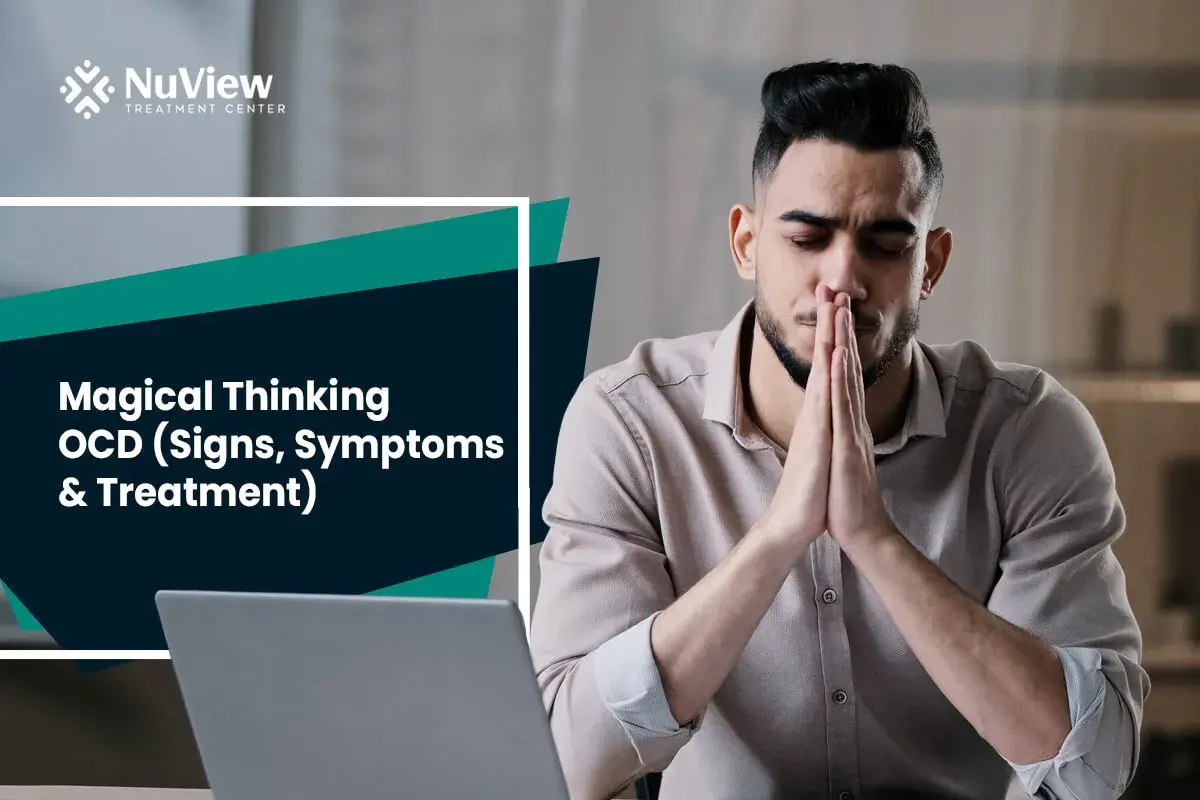
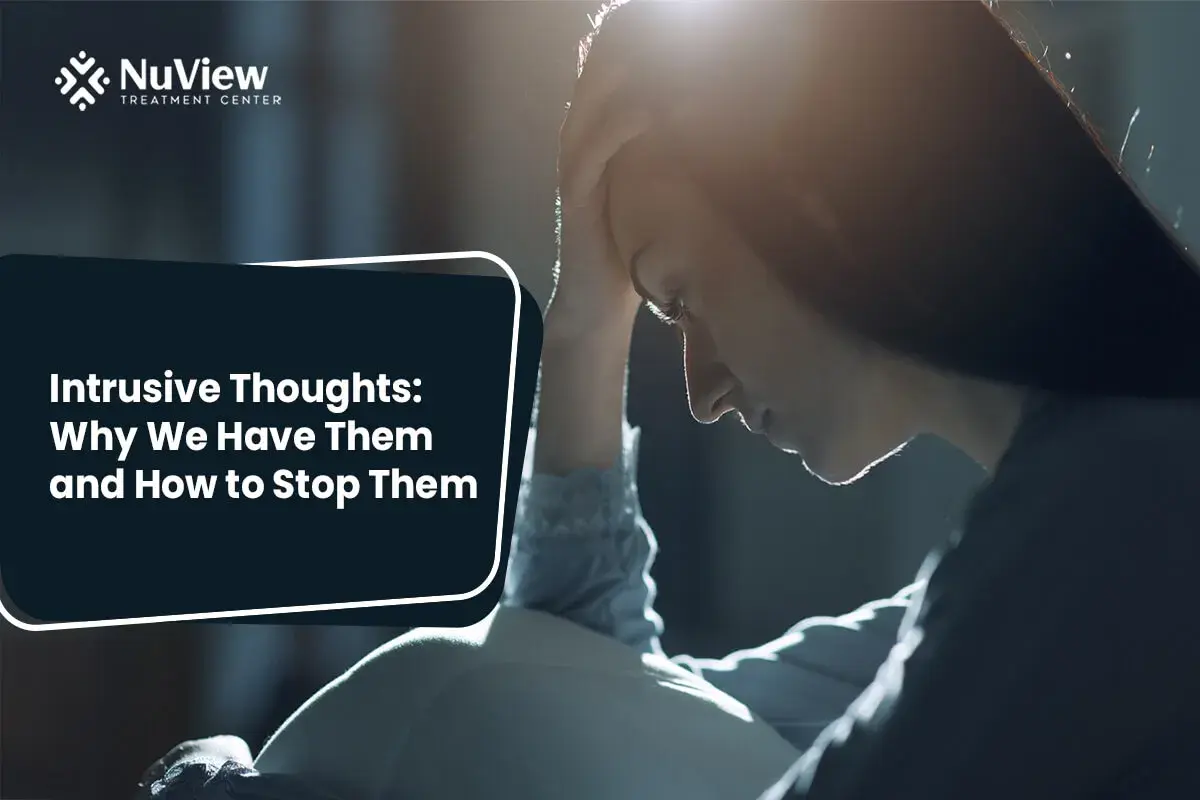
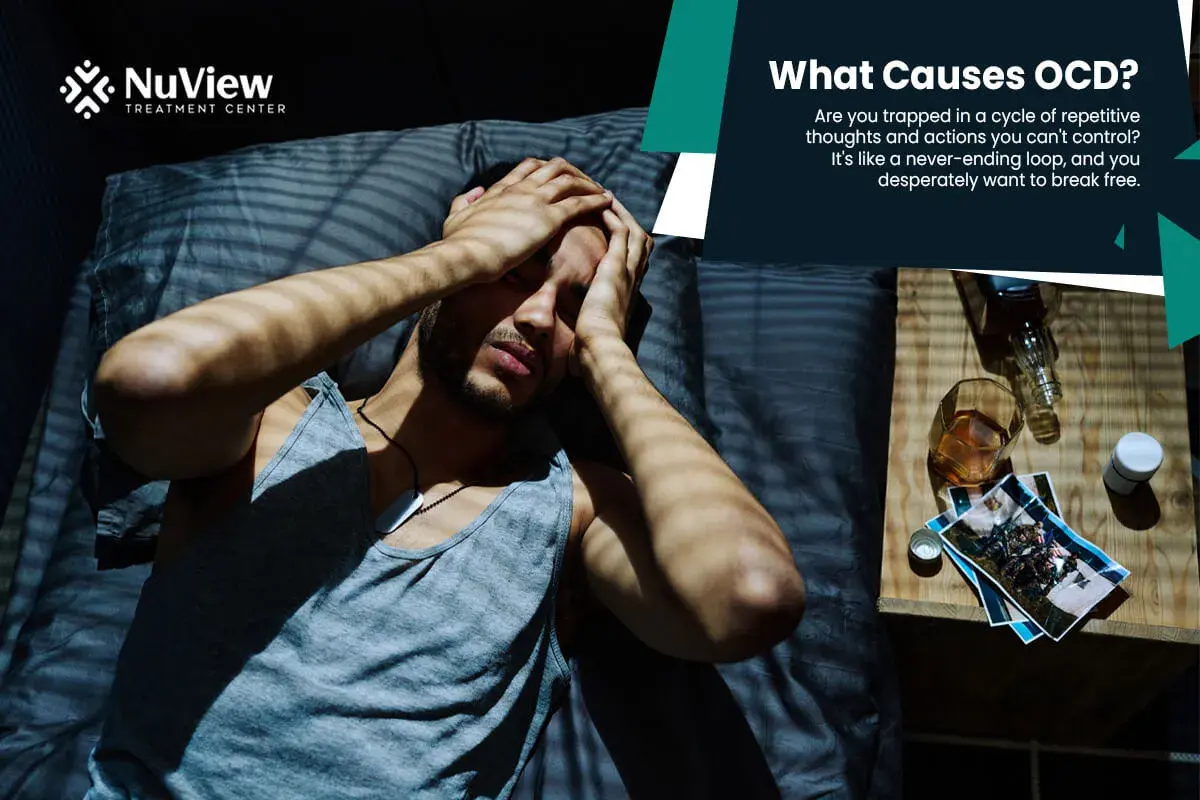
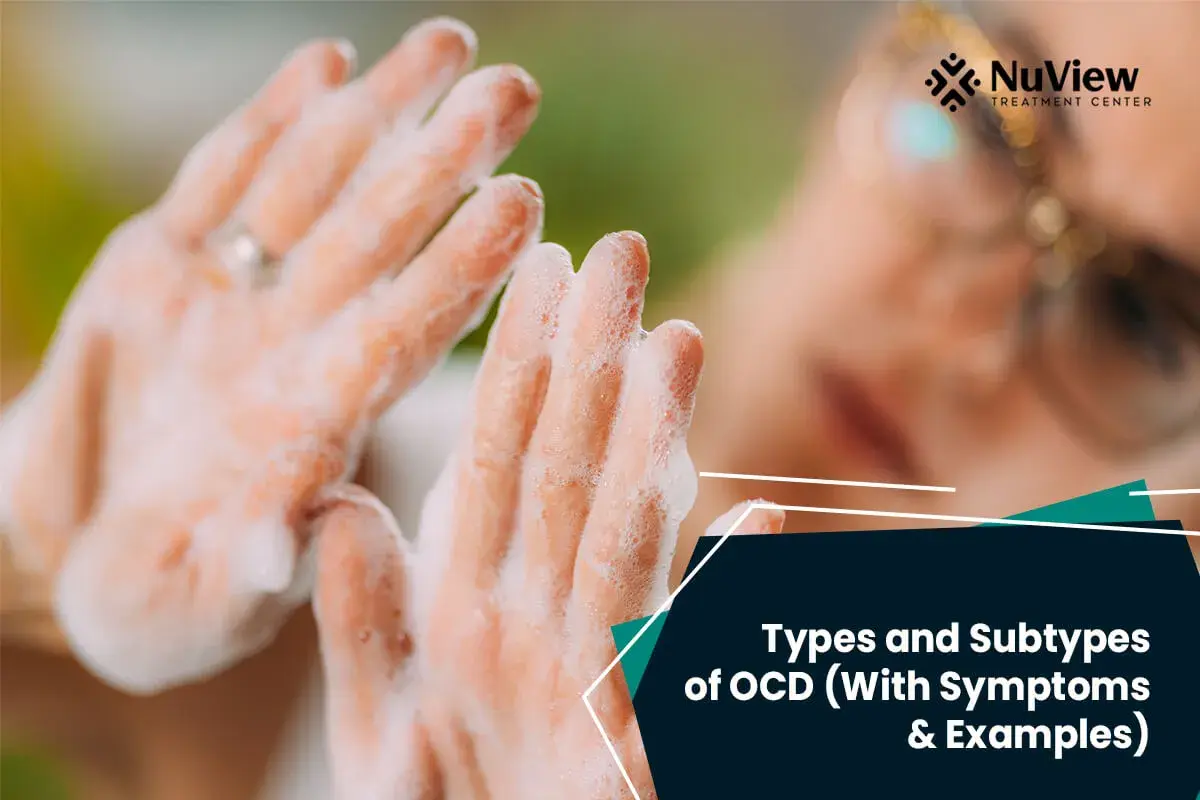



Written By
Dr. Ryan Peterson